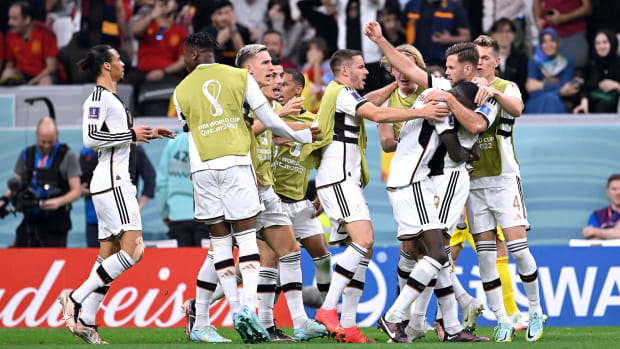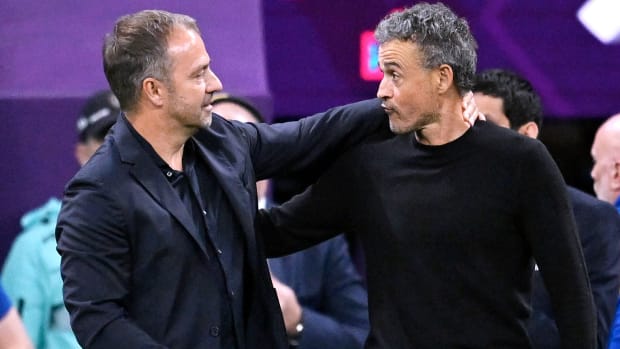AL KHOR, Qatar — In some ways, Niclas Füllkrug’s equalizer with seven minutes remaining didn’t change Germany’s chances of making it through to the World Cup’s knockout stage all that much. It still has to beat Costa Rica to make it through, the only difference after a 1–1 draw with Spain being that it is not relying on Luis Enrique’s side to beat Japan. A high-scoring tie in that game could create issues if Germany wins by only one, but, barring something very unexpected, victory over Costa Rica will be enough to make the knockout stage.
But in other ways, this result and performance at Al Bayt Stadium were vital. This is the first time Germany has ever failed to win either of its first two games at a World Cup. But more significant is that it did not suffer a second successive defeat and, particularly, that in the final 20 minutes or so, it finally looked like a match for Spain. When it needed to, it found the strength of character to force an equalizer.
Germany is not unfamiliar with early defeats in World Cups. In both 1954 and 1974 West Germany went on to win the tournament despite defeats in the group, to Hungary and East Germany, respectively. In 1982, West Germany lost to Algeria, but still made the final. Even in 2014, when Germany was last triumphant, there was a major early wobble in a draw against Ghana. Its strength has always been its capacity to fight back from that, usually following a robust team meeting.

Laci Perenyi/Imago Images
But that has been based in the culture of Fuhrungsspieler—literally ‘leader players’—such as Lothar Matthaus, Karl-Heinz Rummenigge and Franz Beckenbauer, who drag the team through the crisis. The big question in German football is whether the overhaul of youth development that has taken place over the past two decades has improved the technical and tactical level—so that German coaches are now the most sought after in Europe—but at the expense of resilience and a basic nous to get through tournaments. İlkay Gündoğan is believed to have been very vocal in his criticism of the performance, with Manuel Neuer and Antonio Rüdiger also weighing in.
The edge had been taken off Sunday’s game—elimination could have been in play with a loss—by Japan’s defeat to Costa Rica earlier in the afternoon, but there was no sense of the sides settling for a mutually beneficial draw. It took a fine save from Neuer to deflect an early shot from Dani Olmo, whose darts down the left are vital to giving Spain penetration, onto the bar, and that set the tone. Spain looked far more accomplished in possession, and Germany’s only threats were set plays and the danger Spain put itself in with the occasionally sloppy distribution from goalkeeper Unai Simón.
The breakthrough came just after the hour mark, with Álvaro Morata coming off the bench to score for the second straight game. His near-post finish with the outside of his foot suggested a player rediscovering his confidence, but it was crafted by the partnership of Olmo and Jordi Alba down the left.
At that point, there was a serious danger that Spain might inflict a two- or three-goal defeat that would make qualification for Germany extremely difficult, but a triple substitution by Hansi Flick with 20 minutes remaining changed the balance of the game.

Laci Perenyi/Imago Images
“We have the mentality and we deserved the chances,” Germany’s manager said. “There was a shift in the match and we went in hard. Things start to develop when you start to win, so hopefully this will give us the self-confidence to strike goals. The things that Niclas Füllkrug did showed that confidence.”
Most important was the entrance of that man, Füllkrug, a bruising 29-year-old cente forward from Werder Bremen. He was making only his third international appearance, and earlier this month became the second-oldest outfield player to make his debut for Germany. He does not look like a modern footballer. But he is big and powerful and, over the last season and a half, he has been prolific in the Germain second flight. His strike with seven minutes remaining was bluntly emphatic as he surged onto the loose ball and lashed a ferocious shot into the top corner. Pretty it was not, but it was effective—and it removed a lot of the potential obstacles to Germany’s qualification for the last 16.
It also exposed some of the flaws in this young Spain side. It may have ripped Costa Rica apart, but it does lack a little central attacking punch and there is, perhaps, a lack of physicality and a vulnerability to being pressed. Germany’s shortcomings are far more significant but at least here it showed that the battling spirit of old has not entirely disappeared.







